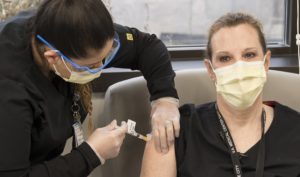
ER Registered Nurse Pamela Makris was the first employee to receive the vaccine at the Salt Lake City, UT, VAMC earlier this year. Photo from Feb. 10, 2021, VAntage Point blog.
WASHINGTON — Nearly all, 98%, of VA employees facing a COVID-19 vaccination requirement have had at least one dose of vaccine or have requested an exception or extension, according to White House data released just before Thanksgiving.
More specifically, according to federal officials, 87.8% of agency employees covered by a vaccination requirement have had at least one dose of a COVID-19 vaccination by Nov. 23.
As of Nov. 24, the VA stated on its COVID-19 National Summary website that 320,936 employees had been fully vaccinated.
The VA was the first federal agency to mandate that its employees be vaccinated against the novel coronavirus, and it worked hard to meet that mandate, as well as deadlines set by President Joe Biden.
“We are laser-focused on vaccinating our workforce ahead of the November 22 deadline for federal employees,” VA press secretary Terrence Hayes said in a statement to U.S. Medicine. “Like other federal agencies, we continue to collect and validate vaccination information from employees as we approach the deadline. This remains one of our highest priorities as VA continues to maintain its obligation of keeping America’s veterans safe and healthy.”
In October, VA Secretary Denis McDonough announced that the department had started administrative actions against staffers who failed to meet deadlines for getting the vaccine. Most of the 420,000 employees at the agency had until Oct. 8 to provide proof of vaccination to their local VA Occupational Health Office.
McDonough also said at an October press briefing that the disciplinary process had begun for those employees who are refusing vaccines or who haven’t shared their vaccination status.
McDonough said the most important goal is to keep veterans safe. “Anytime any vet walks into any VA facility or anytime any VA employee appears in a veteran’s home, that veteran needs to know that we have done everything in our power to keep them safe,” he told reporters.
Religious Exemptions
“We will of course try to accommodate the religious exception for an employee who has sought the religious exception from being vaccinated,” McDonough said. “But if we’re not able to operate certain healthcare capabilities or provide certain services—for example, if too many employees claim an exemption—this would present an undue hardship to us and ultimately to the veteran. So, in that case, when we’re faced with an undue hardship by a lack of a vaccinated employee, my intention is to deny that employee the religious exception. Once we have all the necessary data, we’ve worked through the [disciplinary] process … and at the end of that process the employee still refuses to get vaccinated, they’ll be separated.”
In guidance to the broader federal workforce, the Biden administration has suggested that agencies consider a variety of factors for granting vaccine accommodations, including “the basis for the claim; the nature of the employee’s job responsibilities; and the reasonably foreseeable effects on the agency’s operations, including protecting other agency employees and the public from COVID-19.”
Biden issued an executive order on Sept. 9, requiring COVID-19 vaccination for federal employees. As of Nov. 22, they were required to be fully vaccinated for COVID-19, except for limited circumstances where an employee has an approved or pending exception or extension.
The White House said several days after the deadline that, in the 75 days since Biden announced the vaccination requirement, the federal government, with more than 3.5 million employees, had achieved 96.5% compliance—meaning employees who have had at least one dose of a COVID-19 vaccination or have a pending or approved exception request—with 92.0% of employees having received at least one COVID-19 vaccination dose. In a blog, the Biden administration emphasized that the requirement did not cause “disruptions to critical services people depend on.”
The White House added that the November deadline wasn’t an endpoint. “For those employees who are not yet in compliance, agencies are beginning a period of education and counseling, followed by additional enforcement steps, consistent with guidance from the Safer Federal Workforce Task Force and the Office of Personnel Management,” it stated. “At any point, if an employee gets their first shot or submits an exception request, agencies will pause further enforcement to give the employee a reasonable amount of time to become fully vaccinated or to process the exception request. This next stage of the process will not result in disruptions to Government services and operations and will result in more employees becoming vaccinated.”

